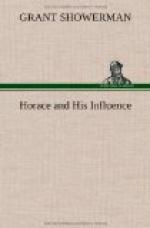3. HORACE THE INTERPRETER OF HIS TIMES
HORACE THE DUALITY
Varied as were Horace’s experiences, they were mainly of two kinds, and there are two Horaces who reflect them. There is a more natural Horace, simple and direct, of ordinary Italian manners and ideals, and a less natural Horace, finished in the culture of Greece and the artificialities of life in the capital. They might be called the unconventional and the conventional Horace.
This duality is only the reflection of the two-fold experience of Horace as the provincial village boy and as the successful literary man of the city. The impressions received from Venusia and its simple population of hard-working, plain-speaking folk, from the roaring Aufidus and the landscape of Apulia, from the freedman father’s common-sense instruction as he walked about in affectionate companionship with his son, never faded from Horace’s mind. The ways of the city were superimposed upon the ways of the country, but never displaced nor even covered them. They were a garment put on and off, sometimes partly hiding, but never for long, the original cloak of simplicity. It is not necessary to think its wearer insincere when, constrained by social circumstance, he put it on. As in most dualities not consciously assumed, both Horaces were genuine. When Davus the slave reproaches his master for longing, while at Rome, to be back in the country, and for praising the attractions of the city, while in the country, it is not mere discontent or inconsistency in Horace which he is attacking. Horace loved both city and country.
And yet, whatever the appeal of the city and its artificialities, Horace’s real nature called for the country and its simple ways. It is the Horace of Venusia and the Sabines who is the more genuine of the two. The more formal poems addressed to Augustus and his house-hold sometimes sound the note of affectation, but the most exacting critic will hesitate to bring a like charge against the odes which celebrate the fields and hamlets of Italy and the prowess of her citizen-soldiers of time gone by, or against the mellow epistles and lyrics in which the poet philosophizes upon the spectacle of human life.
i. THE INTERPRETER OF ITALIAN LANDSCAPE
The real Horace is to be found first of all as the interpreter of the beauty and fruitfulness of Italy. It is no land of mere literary imagination which he makes us see with such clear-cut distinctness. It is not an Italy in Theocritean colors, like the Italy of Virgil’s Bucolics, but the Italy of Horace’s own time, the Italy of his own birth and experience, and the Italy of today. Horace is not a descriptive poet. The reader will look in vain for nature-poems in the modern sense. With a word or a phrase only, he flashes upon our vision the beautiful, the significant, the permanent in the scenery of Italy. The features which he loved




